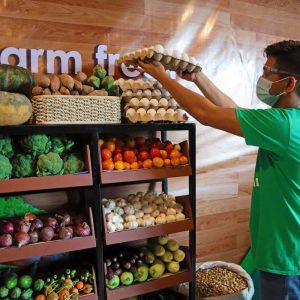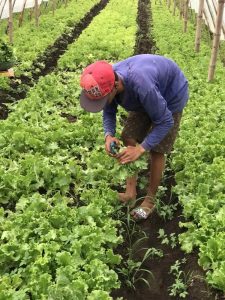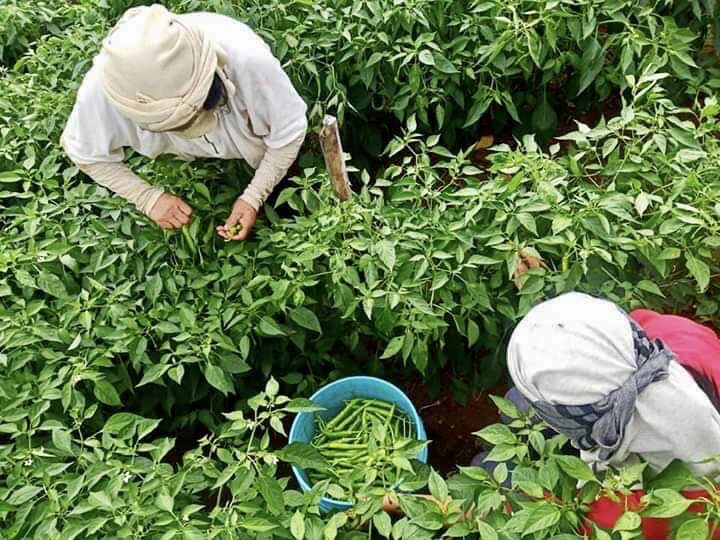by Samantha Chico
 According to the Department of Trade and Industry, the Philippine agriculture sector contributes only one percent to the country’s industry. From 1998 to 2009, the Gross Domestic Product contribution of the sector declined, accounting only to 13 to 14 percent of the total. According to the Food and Fertilizer Technology for the Asian and Pacific Region, structural transformation and rapid industrialization greatly affected the industry. Despite key challenges faced by the sector, it accounts for 22.52 percent of jobs created in the Philippines. On a micro scale, farming has been a main source of income to families. However, farmers are challenged by the lack of access to market and due to the heavy reliance on middlemen, their income is very limited to the remaining margins after the amount cuts. They are further compromised as there is not enough farming land to work on, putting a cap on their produce.
According to the Department of Trade and Industry, the Philippine agriculture sector contributes only one percent to the country’s industry. From 1998 to 2009, the Gross Domestic Product contribution of the sector declined, accounting only to 13 to 14 percent of the total. According to the Food and Fertilizer Technology for the Asian and Pacific Region, structural transformation and rapid industrialization greatly affected the industry. Despite key challenges faced by the sector, it accounts for 22.52 percent of jobs created in the Philippines. On a micro scale, farming has been a main source of income to families. However, farmers are challenged by the lack of access to market and due to the heavy reliance on middlemen, their income is very limited to the remaining margins after the amount cuts. They are further compromised as there is not enough farming land to work on, putting a cap on their produce.
Mayani is an innovative agri-tech social enterprise that consolidates fresh produce from farmers and distribute them to individual and institutional buyers through its online platform. Through this, Mayani can streamline the value-chain, and improve the farmers’ income by at least 30%. For farmers like Felix “Ka-Felix” Bunong, Mayani provides stability in their livelihood. Aside from the competitive pricing they enjoy, Mayani provides them a guaranteed market for their produce, avoiding spoilage and wastage. It also gives them a sense of pride knowing that their produce is consumed by reputable establishments such as Caramia and Amici restaurants.
The presence of social enterprises such as Mayani helps alleviate the situation of farmers by giving them more opportunities to tap markets commonly beyond their reach, enabling them to have an increased income. They also provide capacity-building opportunities to farmers on promoting good agricultural practices to help them produce and maintain quality harvests to meet customer standards. In the case of the Macaangay Farmers Association, an association composed of 33 smallholder farmers in Lian, Batangas and a community partner of Mayani, their partnership has been providing not only improved but stable income to the farmers to-date.
Engaging more than 12,000 smallholder farmers, and big institutional buyers like Amici, Caramia, and Shell, Mayani came in the Social Impact Accelerator (SIA) as one of the more mature enterprises among the six social enterprises in the cohort. SIA is the Innovation for Social Impact Partnership’s (ISIP) accelerator program that aims to assist selected social enterprises to improve their investment-readiness and scale up their businesses and impact.
In the three months under the SIA program, Mayani was provided with mentorship, learning sessions, and access to financial management consultancy to address their identified and expressed needs on the areas of networking, fundraising, community engagement, and financial infrastructure.
According to JT Solis, Mayani’s Co-Founder and CEO, SIA has been helpful in the enterprise’s fundraising efforts as their mentors Eric Manlunas, Managing Partner at Wavemaker Partners, and Simon Bakker, President and CEO of Kennemer Foods, provided them invaluable and actionable pieces of advice. These revolved on structuring Mayani’s fundraising rounds, and in determining the best terms for their business and stakeholders. In the words of JT, Mayani would not have gained access to the wisdom and advise, unreachable for a start-up of their level, if not for the SIA mentoring sessions. At the time of the SIA, Mayani was undergoing the seed round wherein they have received investment from AgFunder, and a seed grant from the Asian Development Bank.
The SIA strengthened the impact DNA of Mayani and developed their intentionality to drive, monitor, and articulate impact.

Aside from fundraising strategies, SIA has been most impactful in Mayani’s pursuit of creating meaningful impact for its partner communities. Joseff Amarra, Mayani’s Co-Founder and Chief Technology Officer (CTO), mentioned that attending SIA learning and mentoring sessions gave Mayani a grounding experience and made them realize that their work does not only impact their business and the investors, but everyone in their ecosystem, especially the farmers and their workers. Moreover, the SIA strengthened the impact DNA of Mayani and developed their intentionality to drive, monitor, and articulate impact.
Acting on this newfound knowledge, Mayani implemented the SUPER (Supplemental Employment and Reintegration) Program wherein Mayani has a preferential option to employ at-risk youth, housewives, senior citizens, and persons-with-disability for the packing and delivering of their goods for their events such as the Grand Bagsakan and the National Food Fair. These are done in partnership with the Department of Trade and Industry (DTI). Through the SUPER program, they provided inclusive employment to 227 people. They also benchmarked with Bellweather, one of the biggest coffee enterprises in the US, in articulating new metrics for impact measurement through the Verifiable Living Income (VLI). Mayani incorporated VLI in their impact mapping activities. The enterprise also plans to release a sustainability report at the end of the year.
One of the activities Mayani underwent in the SIA was the workshop and mentoring session on their Impact Value Chain (IVC), under the guidance of the Business Call to Action. Through these interventions, Mayani was able to streamline their IVC and focus their efforts to contributing to the Sustainable Development Goals (SDG) 2, 10, 12 and 17.
In the future, Mayani plans to explore opportunities in cold chain business in the agro-fishery sphere.
Mayani has been making waves in the Philippine agri-tech space and experiencing hypergrowth in the past year due to its founders’ vision and grit to achieve greater heights. Through ISIP’s SIA program, Mayani is now also able to apply the same passion and energy to achieve more meaningful impact to its partner communities.

